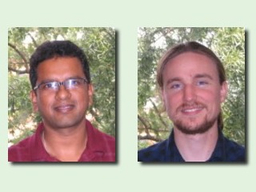Location
University Center : 115
Date & Time
March 1, 2017, 11:00 am – 12:00 pm
Description
| Session Chair | Mina Hosseini |
| Discussant | Dr. Adragni |
Speaker 1: Sai Popuri
- Title
- Parallelizing Computation of Expected Values in Recombinant Binomial Trees
- Abstract
- Recombinant binomial trees are binary trees where each non-leaf node has two child nodes, but adjacent parents share a common child node. Such trees arise in finance when pricing an option. For example, valuation of a European option can be carried out by evaluating the expected value of asset payoffs with respect to random paths in the tree. In many variants of the option valuation problem, a closed form solution cannot be obtained and computational methods are needed. The cost to exactly compute expected values over random paths grows exponentially in the depth of the tree, rendering a serial computation of one branch at a time impractical. We propose a parallelization method that transforms the calculation of the expected value into an "embarrassingly parallel" problem by mapping the branches of the binomial tree to the processes in a multiprocessor computing environment. We also propose a parallel Monte Carlo method which takes advantage of the mapping to achieve a reduced variance over the basic Monte Carlo estimator.
Performance results from R and Julia implementations of the parallelization method on a distributed computing cluster indicate that both the implementations are scalable, but Julia is significantly faster than a similarly written R code. A simulation study is carried out to verify the convergence and the variance reduction behavior in the proposed Monte Carlo method.
Speaker 2: Joshua Hudson
- Title
- Eventual Decay of Solutions to the MHD
- Abstract
- The Magnetohydrodynamic equations govern evolution of the velocity and magnetic fields present for a moving conductive fluid. We will discuss local and global existence results in Gevrey norms for solutions of the 2D and 3D MHD equations. Then, using a uniform bound on both the curl of the velocity and the curl of the magnetic field in L_1, as well as a form of the Leray energy inequality, we get eventual smoothness results.
Tags:
